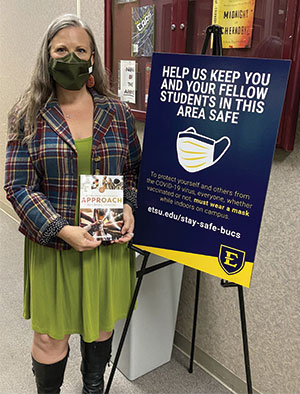Five Ways to Model SEL Competencies This School Year
While school policies around masks, social distancing, and vaccination policies differ, librarians can share common goals to promote social-emotional learning.
|
Relatd Article: COVID’s Long Shadow Centers Social-Emotional Learning in Schools |
In schools across the country, practices around mask mandates, social distancing, and vaccination policies differ widely, making best practices around SEL difficult. We can still share these common goals to promote the five core SEL competencies of self-awareness, self-management, social awareness, relationship skills, and responsible decision-making.
- At the start of students’ time with the librarian, welcome them and tell them what to expect during your time together, how the time will be structured, how everyone will work together, and the kind of behavior and language that is acceptable. Suggest a few agreements, and let them create some of their own, such as: Assume best intentions from others; treat each other with respect (and
 outline, model, or roleplay a few examples of what this looks like). Building agreements creates trust, teamwork, and psychological safety. Having students vote on the top agreements creates social awareness, models making responsible decisions, and builds relationship skills by demonstrating safety and inclusiveness in large groups.
outline, model, or roleplay a few examples of what this looks like). Building agreements creates trust, teamwork, and psychological safety. Having students vote on the top agreements creates social awareness, models making responsible decisions, and builds relationship skills by demonstrating safety and inclusiveness in large groups. - Model self-awareness and self-management. Be vulnerable with students and tell them if you’re having a stressful day. Take a moment and explain how you manage your anxiety or stress. Introduce them to concepts of self-care and have them volunteer their favorite ways to care for themselves.
- Plan a lesson around the 1918 flu pandemic and its aftermath, or the HIV pandemic. This expands students’ social awareness and provides historical context for what they’re experiencing. Help them look for examples of resiliency so they can compare those to their experiences.
- Model restorative justice techniques with students when conflict arises. This practice focuses on preventative action and includes prompt addressing of the issue, an invitation to conversation, and receptiveness to listening and finding common ground. Restorative justice promotes SEL learning competencies.
- Establish a collective care practice among your school’s staff, or more broadly, with students interested in caring for their classmates during difficult periods. While self-care involves doing activities that restore yourself, most people thrive in community with others and need interaction, empathy, and attentiveness from others. When students are involved in collective care, a shared group responsibility, they learn social awareness, relationship skills, and are actively making responsible decisions toward the mental health of their classmates.
Rebecca Tolley (pictured) is the author of A Trauma-Informed Approach to Library Services.
RELATED
The job outlook in 2030: Librarians will be in demand
The job outlook in 2030: Librarians will be in demand
ALREADY A SUBSCRIBER? LOG IN
We are currently offering this content for free. Sign up now to activate your personal profile, where you can save articles for future viewing






Add Comment :-
Be the first reader to comment.
Comment Policy:
Comment should not be empty !!!